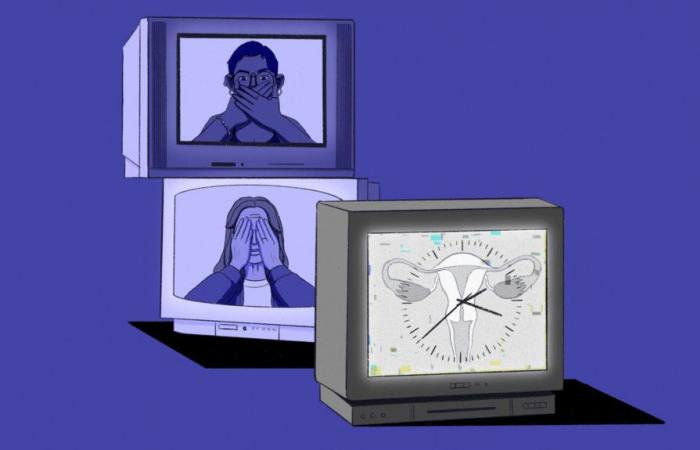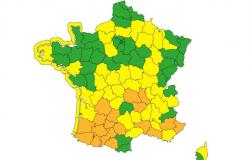Testimonies from women over 45 are popping up all over the internet to shed light on this natural phenomenon which marks the cessation of periods and which causes numerous symptoms that are often overlooked and poorly treated.
The decor is a bit kitsch, in a mix of pale pink and bright red. Sitting comfortably on a padded sofa, Maïtena Biraben, former presenter of Canal+’s “Grand Journal” and co-founder of the online media Mesdames, receives actress Julie Gayet in an atmosphere conducive to confidence, with a breathtaking view of the Eiffel Tower . “How are you ?”asks the host, with a smile on her face. Facing her, the 52-year-old actress responds with a laugh: “I’m having a hard time with menopause! They didn’t prepare me for that (…) It’s quite crazy. I say to myself: ‘Why aren’t we prepared? Why don’t we talk about it ?'”
It is precisely to “talk about it” that World Menopause Day is being organized on Friday October 18. This period of life, which concerns all women, is defined as the cessation of menstruation for more than a year without an identified cause, between the ages of 45 and 55, recalls Inserm. Like Julie Gayet, 87% of women experience at least one symptom of menopause other than the cessation of periods, such as hot flashes, according to this same source. Or other lesser known signs, such as night sweats, vaginal dryness, more frequent urinary infections, feeling tired, having trouble sleeping or feeling brain fog.
Although 14 million French women are affected and 500,000 women enter menopause each year, according to a 2023 Senate report, the subject sometimes remains taboo. “We can’t tell anyone anymore.”regretted Julie Gayet in July, thanking Maïtena Biraben for having founded Mesdames, a digital media which gives a voice to women over 45 years old. “The idea is to tell the true story of this period of life, which is only told through the prism of loss”confided the TV star to Monde during the launch of its media in spring 2024. “It’s an age that is only told in the private sense. ‘You are no longer pretty, you are old. You can no longer have children, you are of no use, go home and die in the long tunnel that leads you in silence to death.’ No !”she also scolded on franceinfo.
Podcasts, social networks, comics, books… In the wake of their younger sisters, who liberated the voice on menstruation, postpartum depression or gynecological violence, menopausal women are gradually undoing the bonds that prevent them from to talk openly about their privacy. For Sophie Kune, director of a digital strategy agency, it all started in 2015, when she was placed in artificial menopause. “I had never heard of it”she remembers. By doing research on the internet, she “only came across very medicalized pages, with images of women closer to the elderly than to menopause. I told myself that I was sick.”
Eager for more intimate discussions on the issue, she decided to create the Instagram account menopause.stories, with the aim of relaying the testimonies of these women in the midst of hormonal upheavals and answering their questions. “For a little less than seven years, we have really seen a very significant development in cultural, media and social productions on the menopause”observes sociologist Cécile Charlap, the only French woman in her discipline to have studied this period of life and author ofMisconceptions about menopause. “It’s completely new. Before that, apart from medical works, we didn’t see anything.”
“Many new resources are emerging, but social representations take time to evolve.”
Cécile Charlap, sociologistat franceinfo
Blandine Grosjean experienced this taboo head-on. Back in 2017, just before the MeToo wave. His documentary Sex without consent is broadcast on France Télévisions and is a great success. She then decides to tackle another female problem: menopause. “I did all my investigation with Anglo-Saxon books and surveysremembers the producer of Menopausea documentary broadcast in 2019. In France, there was only paternalistic literature, which only talked about hormonal treatments.” She then decides to give the floor to those first concerned, not without difficulty. “I had a lot more difficulty collecting testimonies from menopausal women than from rape victimsshe remembers. After the broadcast of Sex without consentI was invited everywhere, to conferences, festivals… Whereas after Menopauseno way.”
Until 2017, menopause was effectively approached from a medical perspective, putting aside its consequences on women’s lives. “For centuries, it was believed that menstrual blood allowed the evacuation of toxic residues from women’s bodies: no longer having a period meant keeping the toxicity inside and becoming toxic yourself”analyzed the philosopher Camille Froidevaux-Metterie in 2019 in an interview with Figaro Madame. Then in the 19th century, when medicine took up the subject, menopause “was immediately defined as a pathology and associated with a series of physical and psychological inconveniences”.
This very medicalized vision of menopause, which continued to predominate throughout the 20th century, did not necessarily contribute to advancing medical research or raising awareness among health professionals. “The initial training of doctors is very poor in this area”deplores Anna Gosset, gynecologist at Toulouse University Hospital. This is why her colleague Isabelle Héron, at the head of the National Federation of Medical Gynecology Colleges, organizes meetings dedicated to caregivers so that they can learn how to better care for their patients. “We became aware of the need for these appointments, because French studies showed that only 6% of patients have hormonal treatment, while 80% of postmenopausal women would be eligible to benefit from it”explains the gynecologist.
It was therefore necessary to wait until the 21st century for things to change in medical practices and laboratories. “There is more and more scientific literature on this subjectHello Anna Gosset There is also more and more research on cardiovascular diseases, while women are still undertreated compared to men.” The practitioner is also delighted with the imminent arrival of a new non-hormonal treatment against the adverse effects of menopause on French territory: this “It’s been a very long time since there’s been any progress like this.”
Despite this progress, it still remains difficult for some women to communicate with those around them, both privately and professionally. In a survey carried out in the spring, the results of which have not yet been made public, sociologist Cécile Charlap questioned menopausal women about the consequences of their symptoms in their professional lives. While 44% of women who responded said they had encountered difficulties in working because of these inconveniences linked to menopause or perimenopause, 37% of them hid the effects from their superiors or colleagues.
“In France, there is a big delay compared to Canada, Great Britain or the United States, in taking into account menopause at workexplains the researcher. Across the Channel, “Research shows that menopause is sometimes one of the reasons why women leave their jobs because conditions are too difficult.” An observation shared by the psychosociologist Laurence Haurat, author of The Menopause Revolution. During his consultations, his patients say that he is still “very complicated” of “take out a fan in a meeting”or even simply “ask to open the window because you have a hot flash”.
It is to break these last taboos that the presenter Claire Fournier, also at the initiative of a podcast on menopause, “Hot inside”, encourages all her friends and colleagues to talk openly about their hot flashes or their insomnia. . “There is still one in three women who hide it from those around themthe journalist is indignant. I tell myself that if I talk about it, it will encourage others to talk about it too and that after a while, it will become a subject like any other.” Especially since menopause is not experienced in the same way by all women. “Menopause is just a stage in a woman’s life”underlines the essayist Elise Thiébaut, author of This is my time: andropause, menopause and other climatic adventures. “It is not a decline, but a regeneration.”






